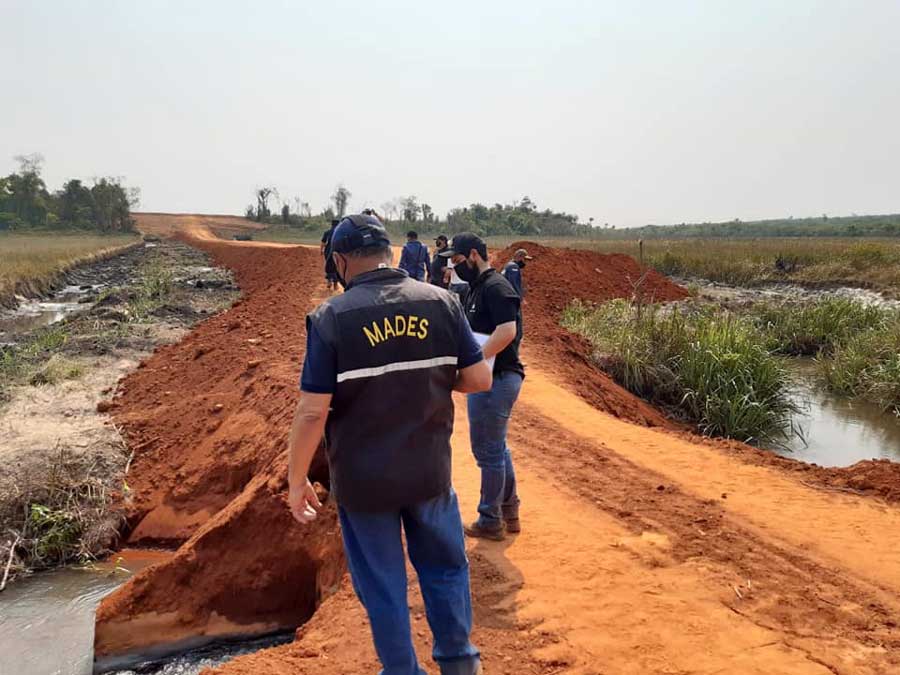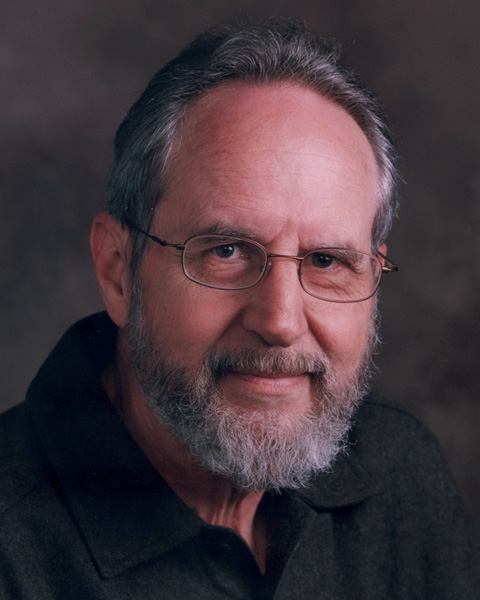From above, the image is eloquent. A stream is blocked to make way for two water channels to a huge soybean plantation. In the 8 de Diciembre community, indigenous residents and small farmers no longer know who to turn to in order to get the government to take action. Photo: Pánfilo Leguizamón
December 8 Committee: David vs. Goliath
The great swamp that provided water to the Stream of Gold is gone. In its place is a pile of sand and logs.
Until 2019, this remnant of water was vital for wild animals and the livestock raised by small farmers in the December 8 community in the state of Canindeyú. The surrounding area was covered with native trees that circled the swamp and the stream. The children of campesinos and indigenous people bathed in its waters. Their parents used its channel for fishing.
All of that has vanished.
The marshy terrain that once was the size of a professional soccer field has only two small water channels left, created by diverting the course of the Stream of Gold toward an immense soybean crop.
Neighbors claim that this devastating handiwork was done by the XT Paraguay company, owned by Ulises Rodriguez Teixeira, one of the biggest players in the lucrative soybean industry in Paraguay.
The blockage of the stream mobilized the December 8 Committee, a small group of farmers who in September 2020 filed a complaint with environmental authorities against XT Paraguay, alleging an “ecological crime.” In addition, the farmers claim the land where the canals of water were destroyed belongs to the government.
Elvio Cabrera, president of the committee, says the farmers filed a complaint against XT Paraguay for clearing almost 2,500 acres of forest in addition to the destruction of the swamp and what the committee considers the appropriation of the stream.
The complaint alleges that the intended use of the deforested land is soybean plantations — on property that is not even owned by the company.
The complaint was taken by Alcides Giménez, a legal representative of the Public Prosecutor’s Office, but to date there has been no progress in the case. Giménez said he has received little cooperation from the Ministry of the Environment (MADES) as he attempts to proceed with his investigation. Representatives of MADES say the requested documentation is not necessary for Giménez’s investigation. The dispute between the two institutions underscores the lack of cooperation among Paraguay’s federal and local environmental officials to stop deforestation.

Since October 2020, Cabrera and other members of the committee have traveled 180 miles at least once a month to the Institute for Rural and Land Development (INDERT) in Asunción to press their case on documentation of ownership of the land.
Cabrera shows a report given to him by INDERT, the government agency that establishes rural subdivisions in Paraguay. He holds up a government map of land ownership that he and members of the December 8 Committee say demonstrates that the property where XT Paraguay diverted the stream does not belong to Rodriguez Teixeira.
Cabrera has other complaints in which he maintains that employees of XT Paraguay are crop spraying with pesticides, an activity that is prohibited because agrochemicals can affect nearby residents of the plantations. Cabrera has photos, has documented complaints, and has videos, but cannot get a response from the government.
“We have a community farm in the area. There are 64 families that have their animals. Our cows drink water from that stream,” says Cabrera, one of the few people in the community willing to speak openly about the situation. “But now they cannot go because they surrounded everything, seized land that belongs to the government and on top of that they killed the stream.”
In the December 8 community, his neighbors are afraid to talk about the case.
“We know his guards. We don’t want to have problems with that man,” said a villager who lives in the area and requested that his name not be published. He has lived there for 60 years and remembers when the whole area was a thick forest where people could still spot jaguars on dirt roads.
Today, the only thing that remains are fields of soybeans. And most of those fields belong to Rodriguez Teixeira.


